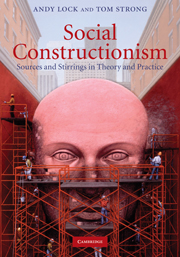Book contents
- Frontmatter
- Contents
- Preface
- Acknowledgements
- 1 Introduction
- 2 Giambattista Vico
- 3 Phenomenology
- 4 Hermeneutics
- 5 Marxism and language
- 6 Lev Vygotsky
- 7 Meanings and perspectives
- 8 Ludwig Wittgenstein
- 9 Gregory Bateson
- 10 Sociologies – Micro and Macro
- 11 Sources of the self
- 12 Michel Foucault and his challenges
- 13 Discourse analysis
- 14 Ken and Mary Gergen
- 15 Rom Harré
- 16 John Shotter
- 17 Concluding remarks
- Bibliography
- Index
4 - Hermeneutics
Published online by Cambridge University Press: 05 June 2012
- Frontmatter
- Contents
- Preface
- Acknowledgements
- 1 Introduction
- 2 Giambattista Vico
- 3 Phenomenology
- 4 Hermeneutics
- 5 Marxism and language
- 6 Lev Vygotsky
- 7 Meanings and perspectives
- 8 Ludwig Wittgenstein
- 9 Gregory Bateson
- 10 Sociologies – Micro and Macro
- 11 Sources of the self
- 12 Michel Foucault and his challenges
- 13 Discourse analysis
- 14 Ken and Mary Gergen
- 15 Rom Harré
- 16 John Shotter
- 17 Concluding remarks
- Bibliography
- Index
Summary
In ordinary experience we're all in the position of a dog in a library, surrounded by a world of meaning in plain sight that we don't even know is there.
(Frye, 1964: 79)Mention the word ‘meaning’ and this can evoke agreement or contention, scientific or religious authority, timeless or ephemeral understanding, oneness with or distortion of shareable experience, a sense of correctly drawing from common knowledge or from one's idiosyncratic notions – and so on. To hermeneutic scholars meaning has ‘meant’ all these things and more. From the ancient Greeks onwards, meaning has been central to philosophy, spirituality, education, law, literature and psychology. In everyday life, reflecting on meaning seems unnecessary as long as our meanings work for us. Why, then, is there such a fuss about meaning? Questions and comments like the following can help orient us to the ongoing hermeneutic project of meaning:
When people say meaning depends on context, what are they talking about?
In what ways are sensing, understanding, articulating and explaining an experience related, and different?
What did spiritual leader X actually mean so many centuries ago?
Why and how are cultures A and B, despite different languages and traditions, able to understand, appreciate and cooperate with each other?
Surely there must be a language for describing things as they really are – or is there?
- Type
- Chapter
- Information
- Social ConstructionismSources and Stirrings in Theory and Practice, pp. 53 - 84Publisher: Cambridge University PressPrint publication year: 2010



